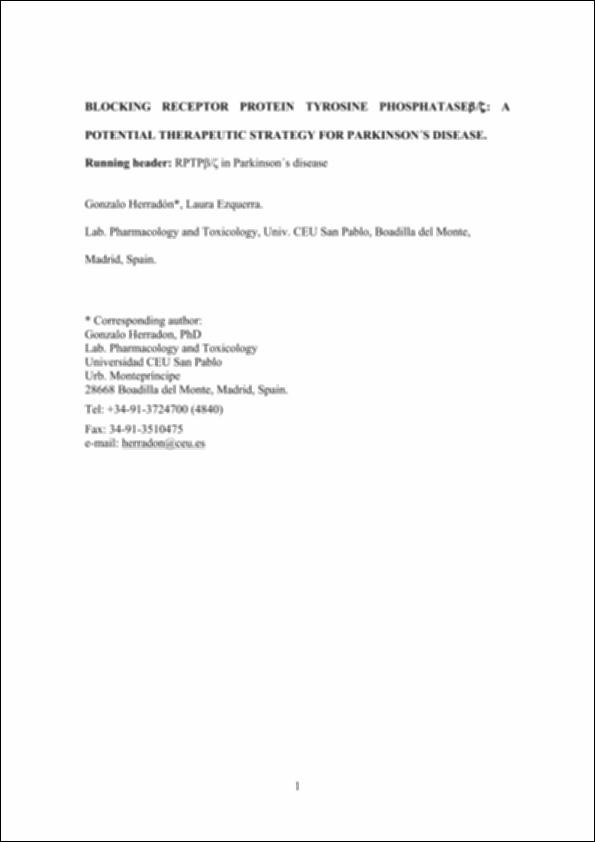Por favor, use este identificador para citar o enlazar este ítem:
http://hdl.handle.net/10637/7110Blocking receptor protein tyrosine phosphatase β/ζ: a potencial therapeutic strategy for Parkinson?s disease .
| Título : | Blocking receptor protein tyrosine phosphatase β/ζ: a potencial therapeutic strategy for Parkinson?s disease . |
| Autor : | Herradón Gil-Gallardo, Gonzalo Ezquerra, Laura |
| Materias: | Parkinson, Enfermedad de; Farmacoterapia; pleiotrophin; midkine; receptor protein tyrosine phosphatase; dopamine; Parkinson’s disease; survival; differentiation; neurodegeneration |
| Resumen : | Pleiotrophin (PTN) is a recently discovered cytokine which has been found highly upregulated in the substantia nigra and striatum of rodents in experimental models of Parkinson´s disease. Interestingly, immunohistochemical studies have shown increased levels of PTN expression in the substantia nigra of patients with Parkinson´s disease. Since, in other contexts, PTN has been shown to be critical in repair processes in the injured nervous system, the antecedents suggest that PTN could exhibit protective effects in Parkinson´s disease. This hypothesis was confirmed when PTN was shown to support survival of dopaminergic neurons and to promote the differentiation of neural stem cells to dopaminergic neurons. These findings suggest a new therapeutic approach in the treatment of Parkinson´s disease based on the molecular mechanism of action of PTN. Pleiotrophin receptor, receptor protein tyrosine phosphatase (RPTP) β/ζ, is found active in monomeric form in neurons and glia within the central nervous system. Pleiotrophin induces dimerization of RPTPβ/ζ inactivating its phosphatase activity, thus increasing the phosphorylation levels of its substrates such as β-catenin, Fyn and βadducin. These substrates have been shown to be critical for the proliferation of dopaminergic progenitors and the survival and differentiation of dopaminergic neurons. This review summarizes the strong scientific basis to consider blocking RPTPβ/ζ as a potentially novel therapeutic strategy in the treatment of Parkinson´s disease and discusses various starting points to design antagonists of this receptor. |
| Descripción : | En: Current Medicinal Chemistry. ISSN 0929-8673. v. 16, n. 25 (2009), p. 3322-3329 |
| URI : | http://hdl.handle.net/10637/7110 |
| Derechos: | http://creativecommons.org/licenses/by-nc-nd/4.0/deed.es |
| Fecha de publicación : | 2009 |
| Centro : | Universidad San Pablo-CEU |
| Aparece en las colecciones: | Facultad de Farmacia |
Los ítems de DSpace están protegidos por copyright, con todos los derechos reservados, a menos que se indique lo contrario.


